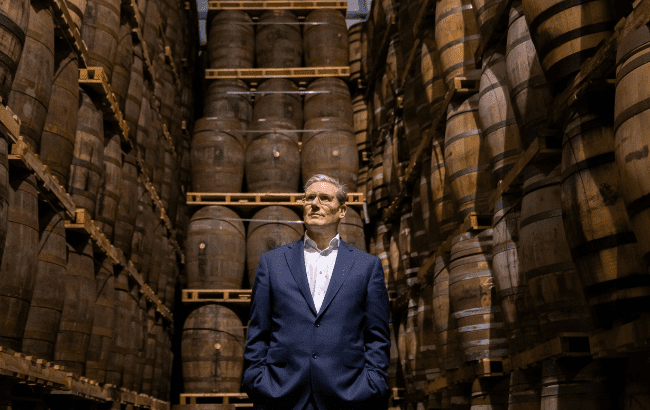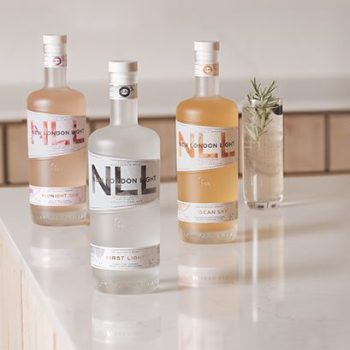Coping with betrayal: the spirits duty aftermath
Keir Starmer’s promise to back the whisky industry “to the hilt” was abandoned after he took power. We report on the aftermath of the latest spirits duty hike.

*This article was first published in the December 2024 issue of The Spirits Business magazine
On the Labour Party campaign trail this summer, the now prime minister Keir Starmer posed for pictures at the InchDairnie Distillery in Fife, Scotland. It was here he said that whisky was to be “knocked back, not down”, and promised that he would back the Scotch sector “to the hilt”, should he be given the opportunity to lead the UK government. Well, the British public gave him that opportunity on 4 July, and it was just three months before those promises of support to the spirits industry appeared to be slashed by chancellor Rachel Reeves when she announced spirits duty would rise again in line with inflation from February 2025.
‘Betrayal’ is a strong word, yet in the days following the autumn budget announcement at the end of October, it was used liberally. While Stephen Russell, co‐founder of Kent‐based Copper Rivet Distillery and spokesperson for the UK Spirits Alliance, called it a “kick in the teeth to distillers”, the Scotch Whisky Association chief executive, Mark Kent, said it undermined “Labour’s commitment to promote ‘brand Scotland’”.
While there is no crystal ball that can be certain of the spirits industry’s future following the hike, you don’t have to look far back in time to see the effect the Conservative government’s unprecedented 10.1% tax increase had on the sector, from which predictions can quite easily be drawn.
Following the 2023 double‐digit duty lift on spirits, Pernod Ricard saw its UK sales dip by 3% in fiscal 2024. At a briefing for the group’s financial results in London, Julia Massies, managing director of Pernod Ricard UK, said the increase had “led to consumer prices going up by over a pound, which has sent the market quite logically into decline”.
Further price increases

With February’s leap looming, UK distillers have warned further price increases for consumers are on the horizon. Howard Davies, co‐founder and director of Devon’s Salcombe Gin, says the increase will have a direct bearing on the brand’s own costs. “We typically do our utmost to try to absorb these costs rather than pass them on to our customers, and indeed this was our approach with the last duty increase. However, unfortunately, it is untenable to always do this and with regret we are likely going to have to increase the cost of our products to our customers to try to manage these.”
Jayne Doherty and Beverley Annan‐Forson, co‐founders of vodka brand Afrique Spirits, will follow suit, as they expect the increase in alcohol duty will affect the brand’s overall production costs, especially in the final stages of bottling and distribution, where the duty is directly applied. They are anxious to approach any price increases carefully to ensure they do not alienate their customers. They say: “By making gradual adjustments and focusing on value‐driven messaging, we hope to maintain consumer trust and minimise impact on sales. It’s essential that consumers understand the factors behind price changes, so we’re focusing on transparent messaging that highlights both the quality of Afrique Vodka and the external duty‐related factors influencing price. We’ll emphasise that while costs are rising, our commitment to quality remains unchanged.”
Educating consumers about the reasoning behind price increases and enabling them to understand profit margins is a tricky task, explains Nick Gillett, Mangrove Global’s managing director. “The margins really are significantly slimmer than consumers realise. As it stands, the average price of a 700ml bottle of 40% ABV gin, as listed in the Consumer Price Index, is £17.41,” he explains, noting the government takes £10.62 of that. “The remaining £7.41 then has to pay for ingredients, production, staff, promotion, distribution, and at least half will be taken by a retailer or stockist – as is their right. Not a lot left for the business that’s gone to the bother of making it in the first place.”
Mitigate costs
One way in which producers and consumers can mitigate the extra costs being levied by the tax is to explore lower‐ABV ‘spirits’ options, which are considered to be more affordable. “Fortunately we already have a non‐alcoholic range of products in our portfolio,” Davies notes, referencing Salcombe’s New London Light range of ‘spirits’ and apéritifs. “Given the duty increase, we will be increasing focus on these, but at the same time we will be ensuring that we continue to provide considerable drive for our Salcombe Gin and Salcombe Rum, where we are still seeing great demand.” But he says: “It does add further pressure on ABV when developing new products to add to our portfolio.”

Meanwhile, Hannah Boon, founder and managing director of Shropshire‐based Distinct Distillers, says she doesn’t want her brand’s product development “to be dictated by government”, but instead “by what we think people want and enjoy”. While she recognises that duty could be an incentive for producers to expand into low‐and‐no, thanks to its high margins, she says “for a consumer, it’s more the trend around wellness that influences their behaviour,” adding that “low‐ and‐no ‘spirits’ are still viewed as expensive, and many [people who are] moderating [their alcohol consumption] would rather just opt for a much cheaper soft drink if price is the main decision factor”.
Some firms believe duty rises result in consumers opting for dearer spirits. Gillett says: “If people are optioning up with their booze, they might splash out on one better‐ quality choice, as opposed to a number of cheaper ones.”
Grasmere Distillery in England’s Lake District plans to “pivot towards alcohol that is generally more expensive”, says Paul Abbott, co‐owner and founder, which he believes will require less explanation to the consumer as to why the price has risen. For him, that means a focus on whisky.
However, Gillett says: “The biggest influence on consumer preferences will undoubtedly be whether the latest autumn budget has indeed put more money back in consumers’ pockets.”
Small firms hit hardest
While the duty rise will affect all UK spirits makers, some have warned that it is the smaller producers that will be hit hardest. As such, Boon argues that it’s not just consumers who need to be educated about the impact of duty rises, but that the government also lacks a grasp on its consequences. She says: “Small businesses are the lifeblood of our UK economy, and increases like this only seek to close these businesses, resulting in higher unemployment and a move toward a monopoly of select big players. It also encourages black market activity, whether that’s in export or counterfeit production.
“By increasing duty, combined with the significant costs of running a business (such as employment costs), the UK government has clearly shown they do not support British businesses, particularly small – medium enterprises.” Boon adds: “Ultimately, it will be the ‘working person’ who faces the brunt of this in higher prices.”
Gillett says the best thing the spirits sector can do is “speak up alongside our colleagues and partners in the industry, advocate for fair treatment of businesses, better support for hospitality, and a less punitive tax regime that stifles the vibrancy of an industry that has always been the UK’s golden goose”.
Related news
Spirits duty hike costs UK govt £500,000 a day
